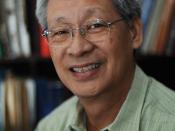Nick Stryker
October 29, 2002
Paper #4
In the writing "The Age of Social Transformation" Peter Drucker explains his views of how a society changes, believing it is driven more by social factors than by politics. In the writing by Lani Guinier "Second Proms and Second Primaries" she explains how both political institutions and socio-economic factors have significant effects on society. In order to get a full idea of what a social transformation is one must know what it means or how it occurs. A societal transformation occurs when a community seeks to have a change in the way they live. Knowing this one should also fully understand what socio-economic factors are, also the definition of what political factors are. Socio-economic factors are any one specific instance that causes a large amount of change on a social or economic situation. Knowing this a political factor could be defined as many changes; either a change in President, a change of ratio of Republicans and Democrats in the House of Representatives, or merely a law being passed.
Socio-economic factors play a greater role in spurring societal change than political factors because society is more concerned with its economic or social value than they are concerned about politics.
Socio-economic factors have spurred societal change. As the 20th century has progressed it has witnessed many changes of occupations; from farmers and live-in servants in the early part of the decade, to industrial workers in the middle of the century, and finally to where we are now with "knowledge" workers. People's demand and need for money has brought about these changes in the workforce. During the early years of the century "...farmers composed the largest single group in every country."(Drucker, 223) This basically means that the farming occupation was the largest occupation in every country.


